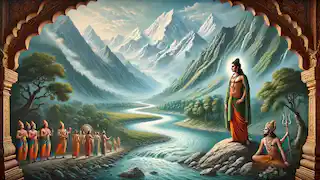In the heart of the majestic Himalayas, amidst the snow-covered peaks and the lush green valleys, lies the sacred source of one of the most important rivers in the world—the Ganges. Revered as a divine entity, the river Ganga is more than just a river for the people of India. It is a lifeline, a mother, and a purifying force. The story of its origin is one of the most captivating tales in Indian mythology, intricately woven with the celestial realms, divine intervention, and human perseverance. This is the story of the birth of the Ganges, a tale of gods, kings, and sages who shaped the course of this mighty river, bringing its waters down from the heavens to nourish the Earth. Long ago, in the kingdom of Ayodhya, there ruled a powerful and just king named Sagara. His kingdom flourished under his reign, and his people lived in peace and prosperity. However, despite his vast kingdom and numerous accomplishments, King Sagara had one deep sorrow: he had no heir to continue his lineage. Determined to change his fate, Sagara performed many rituals and prayers, seeking the blessings of the gods to grant him sons. Pleased by his devotion, the gods finally blessed him, and soon, his two queens bore him sons—one queen gave birth to Asamanjas, and the other to sixty thousand sons. Though Asamanjas was the eldest and a suitable heir, his brothers, the sixty thousand sons, were valiant and brave, adding strength to Sagara’s rule. Years passed, and King Sagara sought to further expand his influence by performing the grand Ashwamedha Yajna, a ritual in which a horse is set free to wander as it pleases, and the king who sends the horse claims dominion over all the lands the horse traverses without opposition. Any challenge to the horse is a challenge to the king himself. The horse was set free, and King Sagara’s army, led by his sixty thousand sons, followed closely behind. Their journey was smooth, as no kingdom dared to challenge the mighty Sagara. However, one day, the horse mysteriously disappeared. The sons of Sagara were furious. They searched the length and breadth of the Earth, scouring mountains, forests, rivers, and deserts. Finally, their search brought them to the netherworld, where they discovered the horse tied near a meditating sage, Kapila. Filled with rage, the sixty thousand sons accused the sage of stealing the horse and attacked him. Kapila, a powerful ascetic, opened his eyes in anger, and with a mere glance, he reduced all sixty thousand sons to ashes. The disappearance of his sons devastated King Sagara. He sought help from the gods and sages to bring their souls peace, but the answer was always the same—the only way to atone for their sin was to perform the final rites of his sons with the waters of the heavenly river, the Ganges. However, the Ganges flowed only in the heavens and had not yet descended to the Earth. King Sagara was now old and nearing the end of his reign. His only hope of redeeming his sons lay with his descendants. Before his death, he passed this sacred duty to his grandson, Anshuman, the son of Asamanjas. Anshuman, a devoted and righteous prince, made several attempts to bring the Ganges down to Earth, but despite his efforts, he was unsuccessful. Years passed, and Anshuman too grew old without fulfilling his grandfather’s wish. Before his death, he passed on the responsibility to his son, Dilipa, who, like his forefathers, took up the task with sincerity and devotion. However, despite performing rigorous penances and praying to the gods, Dilipa also failed to bring the Ganges to Earth. It seemed as though the divine river was destined to remain in the heavens, and the souls of Sagara’s sixty thousand sons would remain in torment. But hope was not lost. Dilipa’s son, Bhagiratha, a prince as determined as his ancestors, was born with a destiny intertwined with the fate of the Ganges. Bhagiratha grew up hearing stories of his great-great-grandfather, King Sagara, and his brave yet doomed sons. The unfulfilled wish of his ancestors weighed heavily on him. Determined to bring salvation to his forefathers, Bhagiratha renounced his throne and kingdom and embarked on a journey of penance and austerities. For years, Bhagiratha performed intense tapasya (meditation and austerity), standing motionless in the scorching sun, the freezing cold, and the pouring rain. His dedication was unwavering, and his devotion reached the ears of the gods. Finally, Lord Brahma, the creator of the universe, appeared before him. “Bhagiratha, your penance has pleased me,” Brahma said. “What boon do you seek?” Bhagiratha, bowing deeply, replied, “O Lord, I seek the descent of the divine Ganges to Earth so that the souls of my ancestors may find peace.” Brahma smiled and said, “The Ganges flows in the heavens, and her descent to Earth will not be an easy task. You must seek the help of Lord Shiva, for only he can bear the force of her mighty currents as she falls from the heavens to the Earth.” With renewed determination, Bhagiratha set out once more, this time to perform penance for Lord Shiva. His austerities were even more severe than before, and after many years of meditation, Lord Shiva appeared before him. “Bhagiratha, your devotion is great,” Shiva said. “I shall grant your wish. I will bear the descent of the Ganges on my matted hair and release her gently upon the Earth.” And so, with the blessings of Lord Brahma and Lord Shiva, the stage was set for the divine river to descend from the heavens. When the Ganges heard of her impending descent to Earth, she was initially displeased. “Why should I, the purest of rivers, descend to the Earth where humans pollute everything they touch?” she asked. But upon hearing the noble reasons for her descent, she agreed, albeit with some pride. “I will descend with such force that no one will be able to withstand me,” she warned. As she began her descent from the heavens, her waters rushed downward with immense power, threatening to flood the Earth. But Lord Shiva, true to his word, caught the mighty Ganges in his matted hair, controlling her fierce flow. He allowed her to trickle down gently in a series of streams, thus preventing the destruction of the Earth. The first place where the Ganges touched the Earth became known as Gangotri, high in the Himalayas. From there, the river began its long journey down the mountains, flowing through the plains and bringing life to the lands it passed. Bhagiratha, leading the way, guided the Ganges to the spot where the ashes of his ancestors lay. As the sacred waters touched the ashes, the souls of the sixty thousand sons of King Sagara were finally released from their curse and ascended to the heavens. The descent of the Ganges not only brought peace to the souls of Sagara’s sons but also transformed the lives of all those who lived along its banks. The Ganges became a source of life, fertility, and purification, nourishing the land and its people. To this day, the river Ganga is revered as the holiest of rivers in India. Millions of pilgrims travel to its banks to seek blessings, wash away their sins, and offer prayers to their ancestors. Bhagiratha’s perseverance and devotion became legendary, and his name is forever associated with the Ganges. In fact, to this day, the phrase “Bhagiratha Prayatna” is used in India to describe a monumental effort to achieve something of great importance. The story of the Ganges’ birth is a reminder of the power of devotion, determination, and the divine forces that shape the world. It is said that the Ganges still carries the blessings of the gods and that those who bathe in its waters are purified of their sins, receiving both spiritual and physical renewal. The river continues to flow, not just as a natural phenomenon but as a sacred symbol of the interconnectedness of life, death, and the divine. From its icy origins in the Himalayas to its vast delta in the Bay of Bengal, the Ganges nourishes not only the body but also the soul of India, a timeless reminder of the bond between the Earth and the heavens. The Ganges River, born of divine intervention, remains a symbol of purity, life, and devotion in Indian culture. Its descent from the heavens, guided by Bhagiratha’s determination and the blessings of the gods, is a story that transcends time, reminding us of the importance of faith, perseverance, and respect for the forces of nature. As it continues its journey across the land, the Ganges brings with it not only water but also the enduring legacy of those who fought to bring it to Earth.King Sagara and the Ashwamedha Yajna

The Quest for Salvation

Bhagiratha’s Austerities
The Descent of the Ganges

The Eternal River

Conclusion
The Story of the Birth of the Ganges River
Reading Time: 8 min

About Story: The Story of the Birth of the Ganges River is a Myth Stories from india set in the Ancient Stories. This Dramatic Stories tale explores themes of Perseverance Stories and is suitable for All Ages Stories. It offers Cultural Stories insights. The divine descent of the Ganges, brought to Earth by Bhagiratha’s unwavering devotion.
















